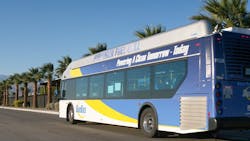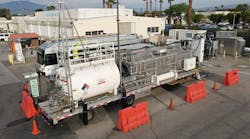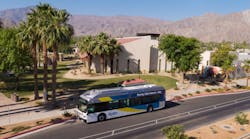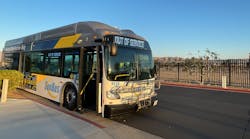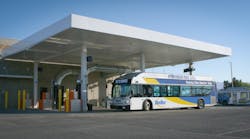Construction begins on SoCalGas, SunLine hydrogen project
Southern California Gas Co. (SoCalGas) started construction on an advanced hydrogen generation system that will produce fuel for SunLine Transit Agency’s 17 hydrogen fuel cell electric buses.
The H2 SilverSTARS project is a demonstration project that will produce hydrogen from renewable natural gas. SoCalGas says the first-of-its-kind project has the potential to provide clean hydrogen at any location adjacent to a natural gas pipeline.
"This is the kind of demonstration project we love to see in California and we're excited construction has started. SoCalGas will use the knowledge gained from this project to help accelerate the adoption of clean hydrogen," said Neil Navin, SoCalGas vice president of clean energy innovations. "Adopting clean technologies and working with SunLine and STARS will help SoCalGas and California reach our shared air quality and climate goals much faster."
The project will use technology developed at the Pacific Northwest National Lab and commercialized by STARS Technology Corporation. The STARS hydrogen generators serve as “chemical transformers” that use a combustion free process that turns water and renewable natural gas into hydrogen. The system is based on 12x1-inch, 3D-printed reactor disks and heat exchangers for installation at fueling stations. SoCalGas says the first STARS system is expected to produce up to 80 kilograms of clean hydrogen per day after installation, which is enough to fuel three of SunLine’s zero-emission buses each day.
"We've been anticipating for this day to arrive and I'm excited construction has begun. Californians will need access to hydrogen and this demonstration project will provide insight during this energy transition," said Glenn Miller, city of Indio councilmember and SunLine Board chair. "Once widely adopted, this project will help meet our state's climate goals."
SunLine’s move to zero-emissions
SunLine has been at the forefront of hydrogen technology for transit buses going back to a 13-month demonstration project in 2000 using a Buy-America compliant fuel cell bus. The agency also completed construction of a hydrogen electrolyzer in 2019, which has created infrastructure that promotes low- and zero-emission technology for the region and sets SunLine up well to establish a fleet that is entirely zero emission.
While the California Air Resource Board’s Innovative Clean Transit Regulation requires all public agencies to transition to zero-emission fleets by 2040, SunLine is on track to be fully zero emission by 2035. The mix of the zero-emission fleet will consist mostly of fuel cell fixed-route and paratransit vehicles, as well as battery electric buses.
The 36-month SoCalGas project was announced in 2021 and will collect performance data on the STARS system’s potential to improve efficiency and cost.
"SunLine has been pioneering hydrogen technologies for nearly three decades and partnering with SoCalGas on this project continues the momentum necessary to make hydrogen fueling accessible to the public," said Lauren Skiver, CEO/general manager of SunLine Transit Agency. "Producing clean hydrogen is the future of fuel, and this system will play a pivotal role in reducing greenhouse gas emissions."

Mischa Wanek-Libman | Group Editorial Director
Mischa Wanek-Libman is director of communications with Transdev North America. She has more than 20 years of experience working in the transportation industry covering construction projects, engineering challenges, transit and rail operations and best practices.
Wanek-Libman has held top editorial positions at freight rail and public transportation business-to-business publications including as editor-in-chief and editorial director of Mass Transit from 2018-2024. She has been recognized for editorial excellence through her individual work, as well as for collaborative content.
She is an active member of the American Public Transportation Association's Marketing and Communications Committee and served 14 years as a Board Observer on the National Railroad Construction and Maintenance Association (NRC) Board of Directors.
She is a graduate of Drake University in Des Moines, Iowa, where she earned a Bachelor of Arts degree in Journalism and Mass Communication.
